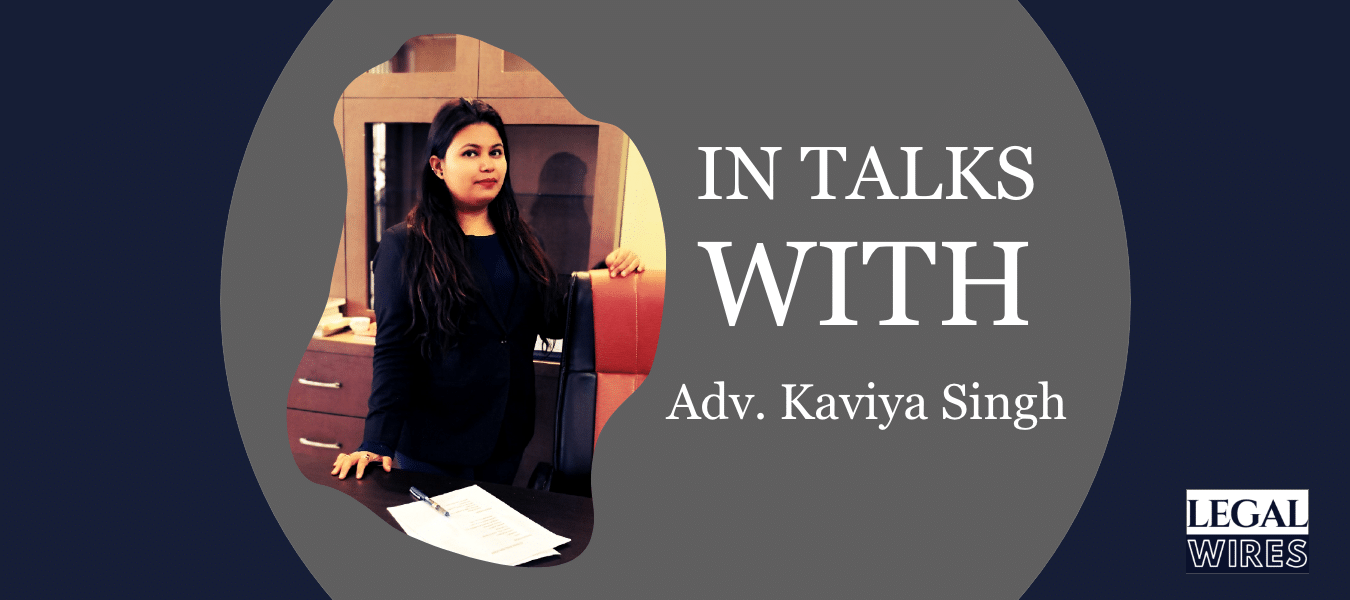Ms Kaviya is a law graduate from Faculty of Law, University of Allahabad and has pursued her LLM in constitutional and administrative law from Amity University.

An Interview with Advocate Kaviya Singh
Ms Kaviya is a law graduate from Faculty of Law, University of Allahabad and has pursued her LLM in constitutional and administrative law from Amity University. She has been a part of Cyberlaw and cyber forensic course run by Asian Law, Mumbai and has also done her MBA in HR from Narsee Monjee Mumbai. She is an educationist author, advocate and legal consultant for various real estate companies and corporate firms. She specialises in document formation and document analyzation for the same. She holds experience in arbitration and conciliation proceedings and is in the procedure for being a part of the Indian Council of Arbitrators. She believes that she is a counsellor by choice and lawyer by profession and has great empathy towards individuals who seek to build a career in the same areas.
Interview:
Q1: Is the e-court system possible in a country like India where only 35% population is Computer literate?
Yes it is. People practicing in civil court are accustomed of using this app and it is very necessary for all of us to be able to keep a record of the proceedings. District courts lay down the backbone of the trails and hence should be made technology rich. In this time of covid-19 it was evident that legal system suffered a grievous setback because of late trials and stayed proceedings.The fact cannot be ignored that if the system was digitalised to the ground level it would have been helpful.
Q2: What are the major challenges that will be faced by litigants through e-courts?
No doubt there will be challenges which the administrative, non administrative staff will face if the system gets digitalised. The number of cases being filed are lakhs in number, it is humanly impossible to keep a record of the same. The lower court system has been running successfully through years including all the glitches yet it has sustained, digitalising the system not only makes it unaccessible for all the members but also probe to cyber attack.
Hence, it will be strongly advised to keep the system liquidified so that no essential information is leaked even if attacked.
Q3: How will the young law students attend the internship sessions if the courts will shrink to a screen?
It is evidently visible that lawyers chamber work has increased as compared to the court work. No one denies to the practicing in the court but unnecessary commotion always creates issues. Legal system has been suffering from a delayed notion of dates in trial, this could be reduced to a larger extent if online system is created and developed. System also suffers from paperwork bundling, that could be very helpful if digitised.
Q4: Can justice-booths or centers be created in rural or remote areas of country so that the litigants can also participate in the court proceedings?
They should be created as they shall expedite the court procedures. And plea for not attending the court proceedings will not be an issue unless compulsory.
Q5: Which is a better option? Creating few more benches of Supreme Court of India or channelizing court’s proceedings through electronic medium?
I would say the digitalisation of electronic medium. It will not only expedite but bring efficiency in the system. Trails are delayed mostly because of non appearance of either the party or the advocate, I won’t say that such defaults are intentional but the possibility cannot be denied and hence unless it is utmost compulsory it should not be granted. Digitalising the proceedings in Supreme Court and High Courts have helped the system, the same should be added to the district level.
Q6: Does e-court system assures speedy justice?
It is a probability on which everyone will have a different point of view. I believe it will.
Disclaimer: The contents and opinions are of the interviewee itself and Legal-Wires neither agrees nor disagrees to the personal opinion of the interviewee.



